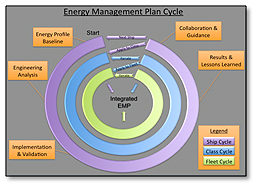In 2009, with increasing focus on reducing fuel and emissions, the Military Sealift Command (MSC) established the Energy Conservation (ENCON) Program and contracted MDD to develop and implement an energy savings program across the fleet. The US Navy’s total yearly fuel usage is 38.8 Million (M) barrels with 15.5M barrels consumed by ships. Military Sealift Command (MSC) operates a fleet of ships that consume 6.2M barrels equaling 40% of the US Navy ship fuel consumption, and making it the largest US ship operator. MDD developed and implemented the energy management and planning process designed to measure fleet fuel usage, leverage energy saving technologies, and promote behavioral change within MSC to reduce Fleet fuel consumption.
Historically, many US Navy and MSC ships were not designed or operated with fuel savings as a top priority. On average, MSC loses 2%-4% when buying fuel due to inaccurate fuel measurement totaling about $45M/Year. The T-AOE 6 class (4 Ships) consume more than 10% of MSC’s total yearly fuel and a single T-AOE 6 uses approximately $1M in fuel to cross the Pacific Ocean. A single T-AKE uses 14 – 20 Power Cords while on shore power costing between $141,000 and $200,000 per month.
 MDD manages energy savings through an iterative energy management planning process to maximize ship efficiency. Energy management includes base lining ship energy usage, developing energy conservation measures, implementing solutions, validating savings from equipment and technology, collaborating within the Fleet, and providing guidance to save energy under all operating conditions. A successful energy management process clearly identifies the types and costs of energy use, promotes an understanding of how energy is used and where to focus reduction efforts, and explores cost-effective ways of using energy through improved operational techniques, new equipment, new processes, or new technology.
MDD manages energy savings through an iterative energy management planning process to maximize ship efficiency. Energy management includes base lining ship energy usage, developing energy conservation measures, implementing solutions, validating savings from equipment and technology, collaborating within the Fleet, and providing guidance to save energy under all operating conditions. A successful energy management process clearly identifies the types and costs of energy use, promotes an understanding of how energy is used and where to focus reduction efforts, and explores cost-effective ways of using energy through improved operational techniques, new equipment, new processes, or new technology.
MDD is involved in implementing the following energy management and conservation efforts:
• Energy Management Process Development
• Engine Management
• Energy Savings Partnerships
• HVAC System Assessments and Improvements
• Navigation Optimization
• Adaptive Auto-Pilot
• Propeller Analysis
• Cargo and Plant Fuel Monitoring
• Trim Optimization
• Fuel Additives
• Selective Lubrication